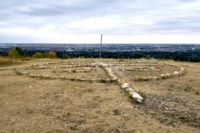Intergenerational trauma plays large role in Indigenous addictions problems
By Lethbridge Herald on July 10, 2024.
 Officials with the Blood Tribe say one of the biggest contributing factors in the opioid crisis is the intergenerational trauma Indigenous people face.
Herald file photo
Officials with the Blood Tribe say one of the biggest contributing factors in the opioid crisis is the intergenerational trauma Indigenous people face.
Herald file photoEditor’s note: This is the first of a three-part series that looks at the opioid crisis in southern Alberta through an Indigenous lens.
Alexandra Noad – LETHBRIDGE HERALD – Local Journalism Initiative Reporter
In April 2023 the Blood Tribe declared a State of Emergency due to opioids.
According to Alberta’s Opioid Response Surveillance Report: First Nations People in Alberta, published in June 2021, First Nations people represented 22 per cent of all opioid poisoning deaths in the first six months of 2020. Which was an increase from 14 per cent in 2016.
While many may have the perception drug abuse only happens in city limits, the Blood Tribe’s declaration of a State of Emergency would prove otherwise.
Leslie Wells, Blood Tribe’s opioid response coordinator, says the opioid response started back in 2014. She says one of the biggest contributing factors to the opioid crisis is the intergenerational trauma Indigenous people face.
“There’s just like a lot of things that contribute to this crisis. But it is here and because even though Kainai is considered the largest First Nations in Canada, that has historical trauma, has really kind of wiped out and caused us to go into crisis not just with opioids but traumas and everything like that,” said Wells.
When someone goes through trauma, it can effect many generations because it not only affects how the person reacts to dealing with the traumatic event but studies have been done which suggest trauma can affect how the body reads DNA, which is then passed on through generations.
Many Indigenous peoples’ trauma stemmed from residential schools and the Sixties Scoop which caused many Indigenous people to be isolated from their culture.
Charles Weaselhead, former Blood Tribe chief and Treaty 7 grand chief, says the intergenerational trauma caused by the residential school system has played major factors in addictions.
“The intergenerational trauma came to the forefront and people started speaking out with regards to the mental health and addiction and the impact that residential school had on huge number of people over that period,” said Weaselhead.
Travis Coleman, fire chief and director of Emergency Services for the Blood Tribe says education on intergenerational trauma is crucial to understanding the opioid crisis.
“I don’t think most people know the severity of the childhood trauma and residential schools on First Nations and Aboriginal people. We see it out here because I work out here and I just don’t think people are educated enough to understand the results of the residential schools and childhood trauma, everything that they had experienced over the years,” said Coleman.
14-13





The First Nations have suffered the highest per capita losses in this crisis, and I would hope this is a wakeup call to their leadership.
Lifestyles of the First Nations are a major contributing factor which has brought many of the hardships. It all begins in the home where many of the issues begin and then spread. Yes you have suffered some major events in the last 150 years, but you fail to understand or want to see that other Canadians suffered major events and got through. Taking responsibility for your own lives and just how you can bring change is important, instead of blaming others, you move on.
Canada is a country filled with immigrants and refugees and many lived under dictators, strife conflict, threats and even torture before moving to Canada, yet within a couple of years found a life of happiness and prosperity they nevet thought possible. They took responsibility of their lives, lives filled with trauma and moved on. They made a choice!
Nothing would make me happier than to see you rising up and overcoming the past, enjoying a life in this country. It begins in you and in your homes!
It would appear that this commentator knows little about Intergenerational Trauma, and its grounding in medical science. It was first identified by an MD in Toronto amongst children of Holocaust Survivors. Since then, it has been documented in other groups in addition to Canada’s FMNI population. Two of those groups are children of WWII Japanese internees and children of those who survived the Bosnian War.
The thing about inter generation trauma is that it manifests itself in various ways. And combined with other circumstances, such as poverty, it’s a toxic brew.
There’s a saying… The chaos stops when I stop the chaos. I heard once this being referred to as the ‘Lost Culture’. If the blame game continues on I’m afraid that this will never end. It’s the young Children who are the only hope of breaking this horrible pattern. If they are in a dysfunctional, abusive home – get them out! and now! It is not okay to continue on like this. Responsibility must be taken on where people are at today, and not 60 years ago. I wish First Nation the very very best, but I’m afraid that it can only heal within and not by expecting someone else to make it better. Demand on your council’s to bring services to your people, and not send your people to the outside resources. They are not surviving 🙁